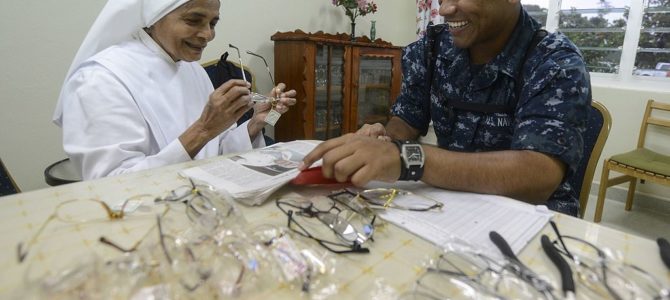
Beneath the shroud of the elderly’s wrinkled, withered skin, parchment thin from age, the Little Sisters of the Poor see Jesus. This vision animates the Little Sisters as they care for the elderly poor in homes throughout the United States and the world, daily confronting the pain wrought by disease and desolation.
But now the attorneys general of six states seek to force these religious caregivers to violate their consciences or pay millions of dollars in fines, and these powerful men want to do this without having to face the Little Sisters in a court of law.
The Little Sisters do not want to be in court either, but the choice was not theirs. Four years ago, the Obama administration forced the Little Sisters into litigation. It was either that, violate their conscience by facilitating health insurance payments for birth control, abortifacients, and sterilization procedures, or pay an annual fine of $2.5 million.
After taking two trips to the Supreme Court and reaching an impasse in negotiating an accommodation with the Obama administration, the Little Sisters finally received a reprieve when, on October 6, 2017, the Trump administration issued new regulations exempting the Little Sisters, and other individuals and entities with a religious objection, from the Affordable Care Act’s birth control mandate.
But within hours of the release of the new interim rules, the attorneys general of California, Delaware, Maryland, New York, and Virginia filed a lawsuit in a San Francisco federal court, challenging the Trump administration’s new religious-based exemption. The Pennsylvania attorney general filed a nearly identical complaint in federal district court in Philadelphia.
No Defending Yourselves in Court, Little Sisters
The Little Sisters sought to intervene in both cases to defend the religious-based exemption—something allowed under federal rules governing court procedures. Yet, in both cases, the attorneys general opposed the Little Sisters’ motion to intervene. It is much easier arguing for “women’s rights” in the abstract than making that argument when challenged by women pleading for their right to religious liberty.
Unfortunately, on Friday the Little Sisters lost in their attempt to intervene in the Pennsylvania case when Judge Wendy Beetlestone, a Barack Obama appointee, denied their motion to intervene. Beetlestone concluded the Little Sisters lacked an “interest” in the litigation sufficient to justify joining the Trump administration’s defense of the exemption.
That’s even though in issuing the new rules, the federal government expressly stated that it sought “to resolve the pending litigation and prevent future litigation from similar plaintiffs;” and even though Beetlestone acknowledged in her opinion that “an interest in relief granted by another court or by a settlement constitutes a sufficiently protectable legal interest to merit intervention as of right.”
Beetlestone’s exclusion of the Little Sisters from the litigation is further troubling given that they have a more direct interest in the outcome of the case than the Pennsylvania attorney general does. The Pennsylvania attorney general sued the Trump administration supposedly on behalf of the women of Pennsylvania whom might be harmed by the religious exemption, while the Little Sisters seek to vindicate their own interest—one of religious liberty.
The Court Case Is Moving Fast
The Little Sisters, who are represented by Becket, immediately filed an appeal with the Third Circuit Court of Appeals. How quickly the federal appellate court rules, however, is unclear. But time is of the essence because, on Thursday, December 14, Beetlestone will hold a hearing on Pennsylvania’s motion for a preliminary injunction—which if granted would prevent the religious exemption from taking effect. A decision on the preliminary injunction motion is likely to follow shortly after the hearing, Eric Rassbach, deputy general counsel at Becket, told me, because the Pennsylvania attorney general asked for a resolution before year’s end.
While pursuing their appeal in the Third Circuit, the Little Sisters will also be heading to federal court in San Francisco on December 1 to support their request to intervene in the tag-team legal challenge to the religious exemption brought by the attorneys general of California, Delaware, Maryland, New York, and Virginia. The Tuesday hearing will serve a two-fold purpose: the court will consider both the Little Sisters’ motion to intervene and the attorneys general’s motion for a preliminary injunction.
It seems unlikely the Little Sisters will fare any better before San Francisco federal judge Haywood S. Gilliam Jr., also an Obama appointee, because, as Becket points out in their motion to intervene, the plaintiffs challenging the religious exemption have taken pains to game the judicial system: “[S]even other lawsuits have been filed nationwide. In only two of those lawsuits, including this one [in San Francisco], have the plaintiffs filed motions for preliminary injunctive relief. Plaintiffs appear to believe that there is a political aspect to this litigation, as they have not sought interim injunctive relief in any cases assigned to Republican-appointed judges.” So it is not just the Little Sisters the plaintiffs prefer to avoid in a court of law!
We will soon know if the attorneys general’s strategy worked, at least in the short-term. In the long-term, another trip to the Supreme Court appears inevitable, with or without the Little Sisters.








